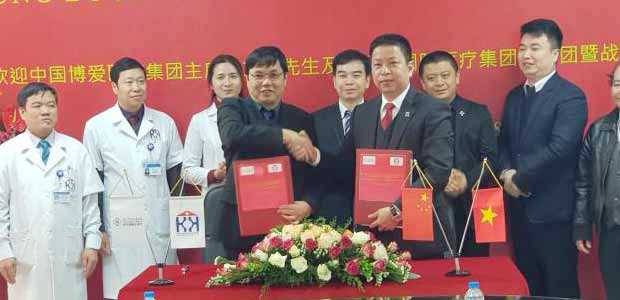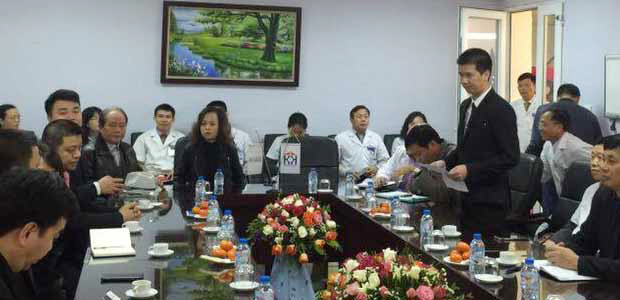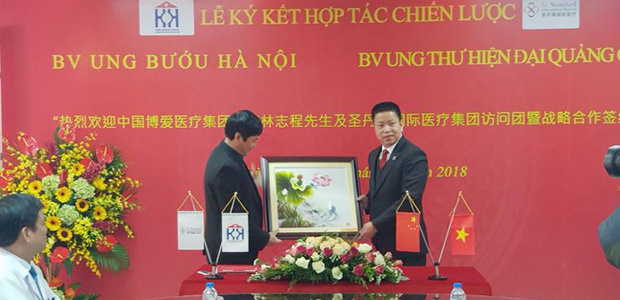China and Vietnam Two Cancer Hospitals officially signed up strategical cooperation agreement
On Jan. 11, 2018, Boai Medical Group St. Stamford Modern Cancer Hospital Guangzhou and Hanoi Cancer Hospital Vietnam officially signed up strategically medical cooperation agreement. Mr. Lin Zhicheng, president of Boai Medical Group and Mr. Lin Daoxuan, medical director of Boai Medical Group and director of Administration Ms Jin Nongyi attended the agreement-signing ceremony. At the same time, Dean of Hanoi Cancer Hospital Vietnam Mr. Tran Dang Khoa, vice-dean Mr. Do Quang Truong, Mr. Vu Kiem, and Ms Nguyen Thi Mai Lan as well as the department directors and experts from the hospital showed up in the ceremony.

The agreement-signing ceremony
Hanoi Cancer Hospital Vietnam, as one of the three cancer hospitals in Vietnam, has been working on medical innovation, insisting studying and introducing leading management modes, discipline construction and medical technology from top-notch medical institutions in the world to promote the development and reform of Vietnam medical enterprises. Mr. Tran Dang Khoa, dean of Hanoi Cancer Hospital Vietnam paid multiple visits to China and Boai Medical Group St. Stamford Modern Cancer Hospital Guangzhou for medical communication and he highly recognized and appreciated the leading management mode and minimally invasive treatment technology of St. Stamford Modern Cancer Hospital Guangzhou, which provided a boost to the strategical cooperation between two cancer hospitals.

Visiting Hanoi Cancer Hospital Vietnam
In the ceremony, Mr. Tran Dang Khoa noted that hopefully the cooperation between Hanoi Cancer Hospital Vietnam and St. Stamford Modern Cancer Hospital Guangzhou will strengthen the medical communication between China and Vietnam so as to realize common experts consultation, establish medical resources and information sharing system. At the same time, the cooperation provide an access for newly mode of personnel training, technology introduction, discipline construction and management. It is very helpful for medical enterprises to introduce and develop minimally invasive technology in Vietnam and provide Vietnamese with better medical assistance.

Friendly cooperation between China and Vietnam
Mr. Lin Zhicheng also mentioned that as cancer hospitals, it was our mission to develop and reform medical care and to benefit more people in our countries. Boai Medical Group looked forward to the medical cooperation and communication with Hanoi Cancer Hospital Vietnam, hopefully to achieve mutually beneficial Win-Win cooperation through complementarities.
In the signing ceremony, Mr. Lin Zhicheng put forward that medical care would be open, shared and cooperativein the future. He noted that St. Stamford Modern Cancer Hospital Guangzhou was now introducing artificial intelligence into its medical system and building its intelligent demonstrative wards. Besides, Mr. Lin shared his experience and learning from his visits to intelligent medical institutes in Tai Wan. He sincerely hoped in the soon coming future artificial intelligence could connect medical institutions all around the world together and achieve remote connection, data base sharing, and he wished Hanoi Cancer Hospital Vietnam can build itself into a intelligent hospital in the future.
This signing ceremony, practicing the principle of The Belt and Road to achieve mutual medical development, marked the beginning of the intelligent medical cooperation between China and Vietnam and intelligent medical construction!
*Surgery, in addition to the appropriate chemotherapy and radiotherapy, are effective in treating early cancer, but certain patients in late stage of cancer may not be tolerate surgery well as they can be relatively weak. A combination of carefully planned minimally invasive therapy, chemotherapy or radiotherapy can effectively reduce the side effects and discomfort of treatment and may help patient get better efficacy.













 viber
viber